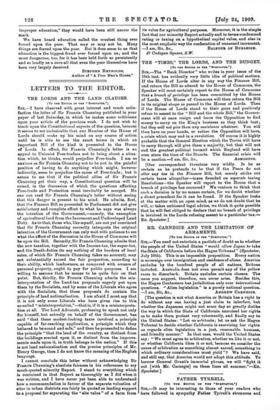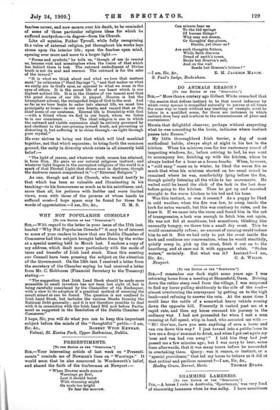FATHER TYRRELL. (TO THE EDITOR. Or TUN • srearwroa.'i Sxa,—It
may be interesting to those of your readers who have followed in sympathy Father Tyrrell's strenuous and
fearless career, and now mourn over his death, to be reminded of some of those particular religious ideas for which be suffered martyrdom—in degree—from his Church.
Like all mystics, Father Tyrrell, while fully recognising th e value of external religion, yet throughout his works lays stress upon the interior life ; upon the fearless open mind, opening ever more and more to a larger light :—
" Forms and symbols," he tells us, "though of use to remind us, become void and meaningless when the vision of that which lies behind them is lost. The outward embodiment of Divine truth is not its soul and essence. The outward is for the sake of the inward."
"It is what we think about and what we love that matters most," he reiterates (" Hard Sayings "), "and that makes us what we really are in God's eyes, as opposed to what we seem in the eyes of others. It is the secret life of our heart which is our highest noblest life. It is in the theatre of our inmost soul that the great drama of our life is played. Heaven is but the triumphant advent, the unimpeded reign of God in the soul. And so far as we here begin to enter into eternal life, we must live principally at home—in our own hearts, and regard that as the chief scene of our existence. Eternal life is friendship with God —with a friend whom we find in our heart, whom we listen to in our conscience The ideal religion is one in which the outward and visible expression shall be entirely governed by and obedient to the ever-growing inward truth, not perverting or distorting it, but suffering it to shine through—as light through pure crystal."
He ever strives to bring out that which will bind mankind together, not that which separates; to bring forth the common ground, the unity in diversity which exists in all sincerely held belief
The light of reason, and whatever truth reason has attained, is from Him. He gave us our natural religious instinct ; and whatever light lingers in the corruptest religions of the world is a spark of that Eternal Light that shines ever in darkness, though the darkness cannot comprehend it."—(" External Religion.") As one, though not of his Church, who would testify to that which has been so valuable and illuminating in his teaching—to his humaneness as much as to his saintliness, and, more than all, his patience with feebler and more limited views, even with those of the persons at whose hands lie suffered most—I hope space may be found for these few
words of appreciation.—I am, Sir, &c., G. M. S.



































 Previous page
Previous page